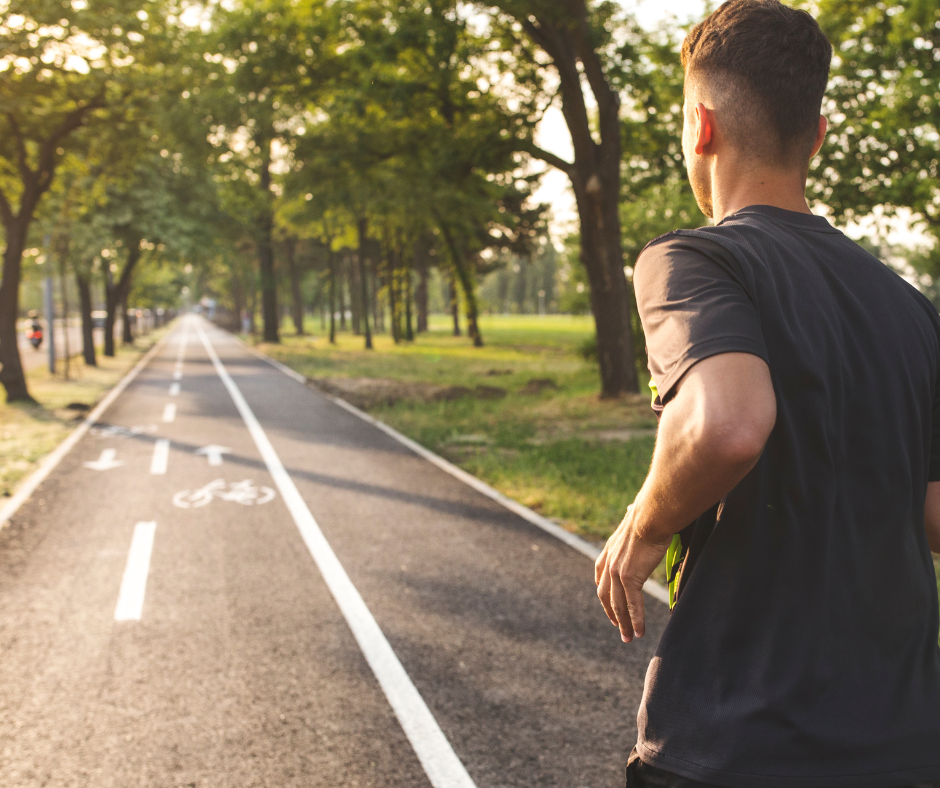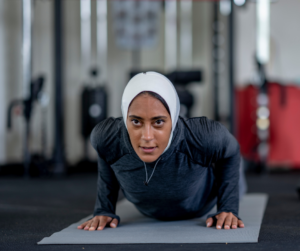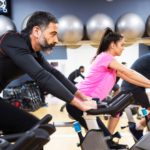Training during Ramadan is a fantastic idea as long as you follow the correct nutritional, hydration, and training guidelines that will help you train safely and effectively while maintaining your overall health and well-being.
It is important to hydrate correctly so that you stay hydrated before, during, and after fasting. It is recommended that you train after breaking the fast so that you don’t train on an empty stomach and so that you can drink water after & before your session. A balanced diet with enough nutrients including protein, carbohydrates, and healthy fats should be consumed.
With the combination of a sound hydration strategy and a sound nutrition strategy, all you need is a safe and effective training strategy and then you’re all set to train successfully through Ramadan.
In this article we’re going to look at:
- Timing of Workouts During Ramadan
- Types of Training During Ramadan
- Nutritional Considerations
- Sleep Challenges During Ramadan & How To Overcome Them
- Avoiding Overexertion During Ramadan
- Importance Of Hydration
- Adjusting Intensity & Duration Of Training Sessions
- Listening To Your Body
- Seeking Professional Coaching Help
- Top 5 Tips For Training Safely During Ramadan
Let’s begin…

Timing of Workouts During Ramadan
The timing of workouts during Ramadan is a matter of personal preference and should take into account the individual’s physical abilities and energy levels.
Some people prefer to exercise before the fast begins at sunrise, while others wait until after breaking the fast at sunset. It is essential to stay hydrated and to listen to your body’s signals, avoiding overexertion or dehydration.
It is also worth noting that during Ramadan, many people experience a change in sleep patterns and may feel more tired during the day. This is why it’s important to adjust training routines and intensities accordingly.
By following several nutritional, hydration, and training guidelines and by training at the correct times for your body and mind you’re ensured a successful training month through Ramadan.
We put together an article diving into this topic in more detail: This Is The SAFEST Time To Train During Ramadan
Let’s have a look at the type of training you should be doing…
Types Of Training During Ramadan
You need to take out the intensity and moderate the volume of your runs, I recommend running in the evening during Ramadan, breaking fast with a minimal meal and some water, then heading out for a 45-60min run and then eating again and drinking after (and during the run).
Starting with lower-intensity and shorter-duration workouts, and gradually building up as the body adapts to the changes recommended.

The most important thing to remember is that not everyone will react the same to their fasting and that’s why you need to start at a low intensity and see how your body reacts.
Here at Coach Parry, we encourage those who observe Ramadan to either moderate training BEFORE their final meal and drink in the morning or AFTER their initial light evening meal and drink BEFORE their bigger meal later on.
3 Different Successful Training Methods
Example 1:
Example 1 chose to keep their runs easy 3-4 times per week and limited to a maximum of 30-45 minutes.
They ran right after breaking the fast at sunset with a light meal like soup and then after training they would consume a bigger main meal. This allowed them to have the water and fuel they needed throughout their training. They chose to listen to their body and on days when they felt exhausted they would go for a short walk or do some yoga instead.
Example 2:
Example 2 placed a big focus on their nutrition, they were following a training plan so they stuck with it but decreased the intensity of their runs and strength training.
The training plan consisted of 4 runs a week, no more than 1 hour or 1.5 hours of running at a time, 2 strength sessions per week, and one complete rest day per week.
They chose to train after work in the afternoons so that they could break fast directly after training.
Example 3:
Example 3 felt that training in the mornings directly after breaking the fast worked best for them. They have a strenuous day job so training in the afternoons was too exhausting. They would run no more than 15 kilometers at a time at a very easy pace and make sure they fuel with slow-releasing carbs before heading for their morning runs.
They would however manage to do a very light-intensity strength class after breaking the evening fast but found that sometimes exercising that late in the evening affected their sleep.
They told us that training in the mornings and then not being able to sip water after your run is a big challenge and takes time to get used to.
Fueling your training sessions during Ramadan requires a balanced approach to nutrition…
Nutritional Considerations
To maintain energy levels and support your recovery you need to consume complex carbohydrates, lean sources of protein, a variety of fruit & veg, stay well hydrated, and listen to your body to adjust your training intensity as required.
A nutritious meal for someone training in Ramadan should consist of:
- Complex carbohydrates
- Lean protein sources
- Healthy fats
- Hydrating foods
- Plenty of fluids
We dive into each of these in a lot more detail here: Fueling Your Workouts During Ramadan: A Nutrition Guide
Sleep Challenges During Ramadan & How To Overcome Them
Fasting can result in sleep challenges for a lot of people due to changes in eating and hydration patterns, changes in hormonal balances, and mental and hormonal stress.
Let’s find out of you’re getting enough quality sleep or not… here.

Avoiding Overexertion During Ramadan
It is important to prioritize safety when training during Ramadan and that means adjusting your training as you need to avoid overexerting yourself and risking injury or health implications.
- Pay attention to your body’s signals, and avoid pushing yourself too hard if you feel fatigued or dehydrated.
- Make sure to drink plenty of water before, during, and after exercising to avoid dehydration.
- Consider speaking with a doctor or fitness professional like one of the Coach Parry coaches for guidance.
To keep energy levels up, and maintain their fitness and mental well-being, there are a few physical and mental challenges athletes who practice Ramadan need to overcome… This is how they do it.
Importance Of Hydration
You must hydrate adequately to compensate for the body fluids lost while you are training or when you are fasting.
Prepare for your day of no liquids by drinking water as often as possible during the night, keep a big bottle of water next to your bed so that when you can, try and drink about a cup at a time.
Throughout Ramadan and especially if you are training during Ramadan, keep a close eye for dehydration symptoms, as soon as you start to notice any of the symptoms listed below you should consult a doctor immediately.
- Dry and wrinkled skin
- Feeling exhausted
- Unable to concentrate
- Dizziness
- Constant fatigue
- Sleeping more than usual
- Dark Urine
A good way to know if you have hydrated enough is by looking at a Urine color chart.
If it’s a very light straw color or a very light yellow color, you’re good to go run and enjoy it.
If it is very dark or even orangey, then it means you are probably in a dehydrated state, especially the first-morning batch of urine.
Adjusting Intensity & Duration Of Training Sessions
While fasting the chances are very high that you will experience changes in energy levels and physical ability… This is common and the reason why you need to adjust the intensity and volume of your runs or strength training sessions.
Tried & Tested TRAINING METHODS For Runners During Ramadan

Listening To Your Body
It’s vital to listen to your body throughout the month of Ramadan, your energy levels will vary, and you will need to listen to your body to avoid injury by recognizing when you need to slow down or stop exercising.
It is important to be mindful of your body’s signals and adjust your training routine as needed to ensure that you can exercise safely and effectively.
Seeking Professional Coaching Help
If you have any concerns, consider speaking with a professional for guidance.
Here at Coach Parry, we have an in-house Sports Nutritionist, She has been working in the field of dietetics for around 20 years and has been concentrating on sports nutrition for the last 14 years and started working at High-Performance Centre at the University of Pretoria around 10 years ago.
Work with Nicki de Villiers – Sports Nutritionist
Top 5 Tips For Training Safely During Ramadan
- Ensure to drink enough fluids before beginning to fast to avoid dehydration.
- Avoid training during the hottest hours of the day, and schedule training sessions for early in the morning or after breaking the fast in the evening.
- Reduce the intensity of your training sessions.
- Consume balanced and nutritious meals and limit processed foods and caffeine.
- Pay attention to your body’s signals and adjust your training routine accordingly
Here’s what two running athletes had to say about what they wish they knew before they started training during Ramadan…



Comments are closed.